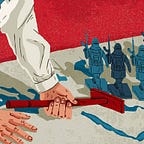10 Most Famous Diplomats (part 1)
Diplomacy refers to the activities of heads of state and special bodies for the implementation of external interactions between states. Special people protect the interests of their country. However, to do this, you need to know the international situation and the state of affairs in different countries. There are many examples in history of politicians showing more talent than professional diplomats. In any case, the greatest figures were able to seize on fleeting signs, good luck and direct the fate of their country in a good direction. During next 5 days I will talk about people who can be considered a truly great diplomat.
1. Pericles (490–492 BC)
At that time, all the major statesmen of Greece had to conduct diplomatic activities. One of the most famous diplomats of the ancient world was Pericles, the leader of Athens, under whom democracy flourished in this city.
The Greek was born into a rich family, where he studied under his father, the leader. He invited his growing son to feasts. There Pericles became acquainted with the art of politics, realizing that you can win not only on the battlefield, but with the help of diplomacy you can sometimes achieve no less. Pericles expanded his traditional education by interacting with prominent philosophers and artists. Over time, he set himself the goal of governing the Athenian state. Pericles began to conduct public activities. He was a very reserved man, whose lifestyle was considered impeccable. And in the house of the politician there were always Athenian scientists, with whom the host talked about science, politics, and art.
In public affairs, Pericles was unselfish and modest, even allowing other speakers to express their thoughts and advice. The politician began to advocate for the preservation of the unity of the Delos Union, calling for the expulsion of the Persians from the Greek sea expanses. But the defeat in the fight against the Persians forced Pericles to change his views. He realized that salvation is possible only in the complete submission of all allies to Athens. A new power could appear that would own the forces and resources of 200 states!
First, the allied treasury was moved to Athens, the city actually became the capital of a strong Maritime power, managing its finances. All that remained was to rally the Greek world. Pericles himself led the fleet and defeated those who did not want to join the Alliance. Although he was seen as more of a general, he considered himself a politician. So, the long-awaited truce was concluded with Sparta. Pericles made Athens the most beautiful city in Greece, ruling it like a monarch. Pericles treated the allies with respect, was reasonable in his approach and attempts to withdraw from the Union were thwarted by military force. At the head of the expedition, the ruler and diplomat established relations with the states of the Black sea, finding new friends. Even with cities in Sicily and southern Italy, alliances were made. But over time, Sparta could not withstand the growth of Athens and the war began. Pericles was given complete freedom. But the war dragged on, and the plague broke out in Athens. The politician and diplomat was dismissed. But it turned out that there were no worthy people in the city to replace the famous Pericles and he was again called to power. But he did not rule long, dying of the plague. Athens quickly realized who it had lost — a great politician, ruler, and diplomat, humble, kind, and worthy.
2. Niccolo Machiavelli (1469–1527)
Niccolo Machiavelli was born in the family of a lawyer. The young man graduated from the city school, but could not enter the University because of the family’s financial problems. Then Niccolo began to study himself, reading the works of Cicero, Caesar, Virgil, Ovid and other ancient philosophers. And his father introduced him to the foundation of legal science.
At the age of 29, Machiavelli was able to be elected to the Chancellery of the Republic. He headed it, taking over the work with foreign and military affairs. During 14 years of work, the diligent Florentine compiled several thousand diplomatic letters, wrote military and government laws, and made diplomatic trips to Italy, the Pope, and even the French king. The situation over Italy was thickening. Machiavelli traveled a lot, persuading his neighbors to remain faithful to their agreements. The mission to France was also important. There, the diplomat also assessed the situation in the country, and his messages home were no less important than the negotiations themselves.
Machiavelli proved to be a subtle psychologist. At the beginning of the nineteenth century, it was Machiavelli who was sent to the hot spots where conflicts only flared up. It must be said that by carrying out numerous assignments of the Republic, Machiavelli turned into a self-aware official. He began to dress well and never spared money for this. The death of the Florentine Republic in 1512 interrupted the political career of the famous diplomat. Once in exile, Machiavelli began to work. In 1513–1520, his most famous works appeared, including “The prince” quoted by many politicians. The diplomat carried out small tasks, but could not return to big politics.
